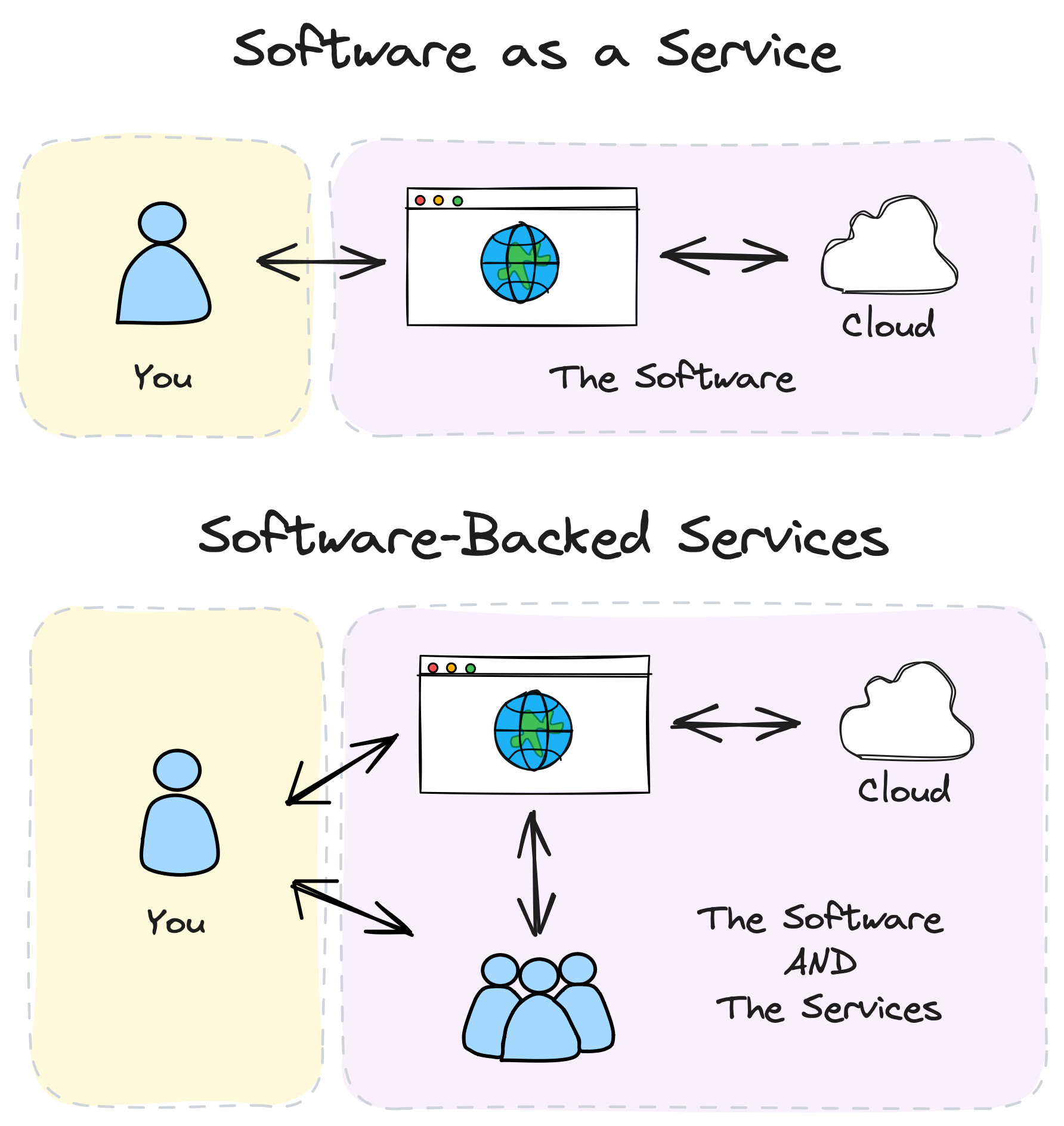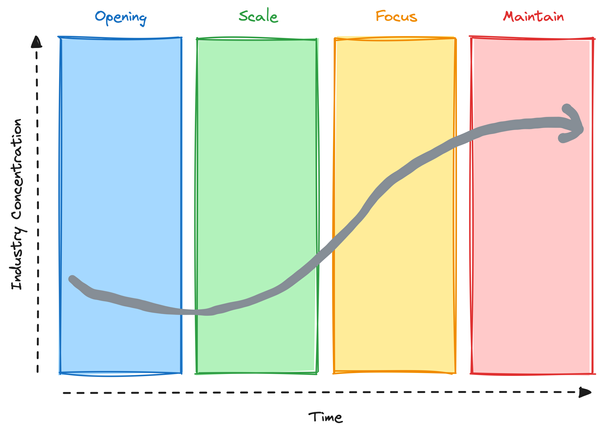Blurring the Line Between Software and Services
The idea of bundling software and services together has been around for about as long as there has been software. In the earliest days of software development, everything was one-off and hand-crafted. When you bought software, the service agreement to either build it from scratch or do the heavy adaptation to make it useful to you were just part of the arrangement.
Fast-forward several decades, and software is becoming easier and easier to build. The infrastructure needed to run a massive app in the cloud is a single click away. No-code solutions are becoming more and more powerful every year, and AI has made writing code easier than it has ever been. As this trend continues, companies are starting to look more and more to a service component of their offering to differentiate themselves.
Service Bundling
Depending on what is being bundled together, and who the services are targeting, there are a few different approaches used when companies bundle products and services together.
VAR (Value Added Reseller) Bundling and Agencies
It's pretty common to see the concept of a VAR (Value Added Reseller) in enterprise software. To illustrate, the VAR might sell you something such as a CRM or an ERP or a software development tool. In most cases, part of the arrangement is that they will also provide you with support and other services. They might help with implementation, integrating the software with your other systems, and other things that the software maker themselves doesn't do directly.
In e-commerce, the way an agency functions is similar to what a VAR does in other industries. There's different variations but an agency might help you pick out and bundle the software you will need to operate your brand, they may help with marketing, do any custom development work needed, etc., all under a negotiated agreement.
In the example of a VAR or an agency, it's unusual for them to own the software in question though, and at most they are using somebody else's software to provide you with the value.
Closing that gap is where the next type of services bundling comes into play.
Added Services
With the added services model, some software might have additional services available. These may have varying amounts of utility depending on the software on question, and shouldn't be confused with various types of upsells that merely introduce another vendor to the user.
These added services are also distinct from additional integrations or added features that extend the software. Instead, they are about getting actual humans involved to help with things where people are still needed.
We can look to Quickbooks for a good example. Quickbooks is of course primarily a web-based Software as a Service play, but they also have a bookkeeping service that they also offer. Anybody who likes the Quickbooks software and just needs little bit of help with bookkeeping to lighten their load can add this service for a lot less money than hiring a full-time bookkeeper.
By using this service, the bookkeepers and your business are all unified with Quickbooks together. You can see everything they are doing in the same old Quickbooks software you are used to. Their services are a natural extension of what you are doing and where you work every day.
Software-Backed Services
The next level of services and software working together is software backed services, or "Services as a Software". The product being pitched isn't software that you can add some services to - it's a service that happens to have its own software.
What does this mean exactly?
For an example of this approach, take a look at Finaloop, a specialized, e-commerce oriented financial services company. Finaloop is a competitor to Quickbooks, and their value proposition is handling your books with specific e-commerce concerns in mind. Standard financial metrics are largely the same in any industry, but there is a lot of nuance to some of the extra data points that e-commerce merchants care about. Integrations are a big deal in e-commerce too, so being able to natively pull information in from Shopify, Amazon, Stripe, etc. makes a lot of sense.
Quickbooks and other major accounting software providers often offer the same integrations, of course. Finaloop is built around e-commerce though, so they integrate the same data in a way that is specific to e-commerce rather than needing to provide a generic solution that meets the needs of ALL industry types.
Most importantly, Finaloop is a complete accounting solution. They go beyond simple bookkeeping to offer a full financial operations service. FP&A, taxes, budgeting, pricing strategy, fundraising, just about everything you might expect a CFO and a full team of accountants to do is covered by Finaloop. The fact it is all backed by custom, tailor-made software that supplements what the services team does is what sets them apart.
So does the software supplement what the services team does, or does the services team supplement what the software does? It doesn't matter much, because the strength of both together is the whole point of the "Services as a Software" play.
The strongest of these software-backed service companies can allow their customers to lean heavily on the software with very little services needed, or they can allow their customers to lean heavily on their services with very little use of the software.

Corso as a Software-Backed Services Company
From the very beginning, Corso was built as a software-backed services company, offering both services and software as a unified product.
The Corso founding team has decades of combined experience in building and operating SaaS products, growing and exiting multiple brands, and building and running contact centers with hundreds of agents. Some of our first hires have experience building customer service and operations teams for several high-volume brands. We know software, but we also know customer service and operations.
When we first launched, we knew we wanted to build the best software available, but we also wanted to build the best customer service team in e-commerce.
It's hard for companies to build world-class software. It's hard for companies to build world-class customer service experiences. Doing both is of course that much more difficult, but Corso has the expertise to do so.
So - what does Corso do as a software-backed services company?
When the customer of one of our merchants has a lost, stolen, or damaged package, they work with a Corso team member for resolution. The customer doesn't talk to the merchant, but the merchant has full access through the Corso software to see all conversations, actions taken on the claim, etc. The merchant can see everything happening via Corso software just as if one of their own team members is interacting with their customers - but a real, live human on the Corso team is the one handling the full resolution. The merchant has fully delegated this part of their service and no longer has to think about it at all.
We also have one of the best merchant success teams in the business, and our team works closely with merchants to optimize their use of the software. Our returns and warranties software is top tier and easy to get started on without needing a lot of handholding, but we won't leave a merchant high and dry if they want some help optimizing the experience. Our services are always open
Looking Forward
What trends await software-backed service businesses?
I can't predict the future of course, but I suspect that software-backed service businesses will remain rather few in number - if for no other reason than the fact that they are rather difficult to do well. Companies that excel at a service model and building and running software are rare because they require distinct skillsets and the ability to focus and execute well on two largely unrelated things.
The approaches to blending software and services will likely continue to evolve as well. Software companies sometimes have consultancy or managed services departments, and service companies can get very good at using off-the-shelf software to provide their solutions. These approaches aren't new, but you can expect to see service companies leveraging home-grown software more and more as software continues to get easier to build; in response, software companies are likely to lean more and more into services.
Businesses need good software to compete, or even function in today's environment. Being able to delegate a component of the service you provide to another company and trust them to deliver on your standards is another way for a company to gain a valuable edge.
Wherever the evolution of software-backed services ends up, successfully merging both together in a compelling way will always prove advantageous.



